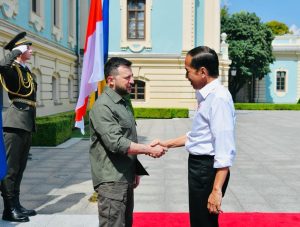Shortly after declaring a partial military mobilization on September 21, Russian President Vladimir Putin announced the annexation of four Ukrainian regions based on sham referenda in those territories, turning the already controversial campaign of aggression into one of outright territorial conquest. As a response, Ukrainian President Volodymyr Zelenskyy stated on his Twitter account that Ukraine would not negotiate with Russia as long as Putin remains president and that Ukraine would apply for NATO membership.
These latest developments have presented the Indonesian government with fresh dilemmas, especially with the G-20 Summit in Bali fastly approaching. Scholars have argued that Indonesia needs to focus on running the G-20 smoothly and tone down its ambition of becoming a peacemaker in Ukraine. However, Indonesia might not have the luxury of avoiding the role of stabilizer in the crumbling international order, especially since President Joko “Jokowi” Widodo himself proclaimed the country’s position at the “pinnacle of global leadership” during his annual Independence Day speech this year.
The international community can never accept the so-called Russian referenda in eastern Ukraine and the subsequent annexations by Russia. Compared to previous referenda, such as the 1999 vote that paved the way for Timor-Leste’s independence, they failed every test of legitimacy: Putin’s referenda were not part of an agreement between the sovereign authority (Ukraine) and the international community (represented by the United Nations); they were not organized by a neutral party (usually the U.N.); and they were held under military occupation by an aggressor country (Russia), when the majority of people from those regions have been internally-displaced or became refugees abroad. Even more so, Indonesia has always stated that a country’s territorial integrity is of utmost importance, as exemplified by its refusal to acknowledge the 2014 Crimean referendum.
It is therefore baffling that the Indonesian government continues to refuse to condemn the Russian actions outright. Instead, on its Twitter account, the Indonesian Ministry of Foreign Affairs reiterated the principle of territorial integrity and rejected the referenda without mentioning the perpetrator. This empty rhetoric and hypocrisy were highlighted by the fact that the Foreign Ministry was quick to stand with Thailand after last week’s daycare shootings but failed to comment on the latest missile strikes on the Ukrainian civilian population by Russia. It is even more inexplicable given the likelihood that the escalation of the conflict could seriously affect the G-20 Summit next month.
Indonesia has the responsibility to act, not to shy away and hide behind the rhetoric of neutrality, foreign policy pragmatism, or the so-called “win-win paradigm” that Foreign Minister Retno Marsudi mentioned during her speech at the U.N. General Assembly last month. As Jokowi mentioned, Indonesia is considered one of the world’s emerging leaders. After holding the G-20 chair this year, Indonesia will be the chair of MIKTA (an organization of middle-power countries including Mexico, South Korea, Turkey, and Australia) next year. Having leadership status among the emerging middle powers comes with a duty to live up to what the international relations scholar Eduard Jordaan has identified as their three primary roles: to act as “good international citizens,” “bridge-builders,” or “stabilizers of international order.” As the scholar M. Faisal Karim has noted, Indonesia under Jokowi has oscillated between its role as a bridge-builder between conflicting parties, a stabilizer of the global democratic and liberal order, and as the voice of the developing world.
The Russian invasion of Ukraine has given Indonesia the chance to rise above its previous position and claim its perceived status as a leading middle power. And yet, the country remains hesitant and cautious; it has attempted to build bridges by visiting Kyiv and Moscow but at the same time has shied away from its other roles to maintain a stable international order. By refusing to engage further in mediating the conflict despite the early effort to visit the two warring countries, Indonesia has squandered its status as an emerging middle power. Furthermore, by adopting a minimal definition of success for the G-20 Summit, which is predicated on the leaders’ attendance and the absence of political drama, the Indonesian government has indicated that it is only interested in the symbolism of leadership status, not the actual responsibility inherent in membership of the global leadership circle.
This author believes that the situation has changed, and a red line was crossed when Putin claimed the annexation of the four Ukrainian regions. Even if Indonesia’s initial stance of hesitancy and caution can be attributed to its “independent and active foreign policy” and its claimed role as a bridge-builder, the Russian annexation of another country’s territory is a direct violation of the principle of territorial integrity. The Indonesian government has no choice but to organize a coalition at the U.N. General Assembly and within the G-20. This coalition of middle-power and developing countries should condemn Russia’s claimed annexation of Ukrainian territories, ask Russia to stop the war and return the occupied territories, stabilize the international order by creating a peace forum after the Russian withdrawal, and, by doing so, uphold the basic principle of territorial integrity.
Middle powers have a responsibility to stabilize the world, especially when the great powers fail to engage in a constructive manner. A stable world where no country can conquer another country’s territories is also in Indonesia’s national interest. This is a window of opportunity for Indonesia to rectify its previously hesitant approach. If Indonesia fails to do this, the stable international order, based on the fundamental principle of territorial integrity, will be gone. Other countries can do what Russia does, annexing territory based on sham referenda or by sheer military might. Furthermore, with Indonesia’s own territorial integrity under threat in several areas, the government’s empty rhetoric and hypocrisy would not have gone unnoticed by many parties. Indonesia’s own normative and moral authority, already under question due to the Indonesian position in the U.N. Human Rights Council’s recent vote on China’s treatment of the Uyghurs, stand to be damaged even more.
































